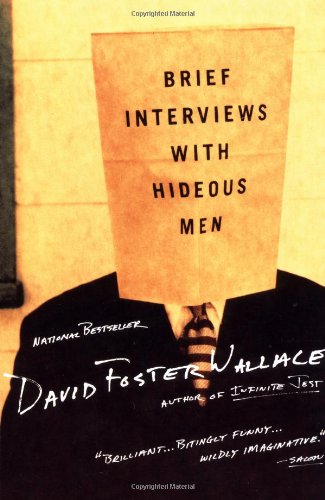
In my continued assault on my summer reading list, a few weeks ago I settled onto my balcony with David Foster Wallace’s Brief Interviews With Hideous Men. To appreciate what I’m about to disclose, you need to understand something about the layout of the condo my wife and I have chosen as our temporary residence: the sliding glass door to the balcony opens immediately beside the TV (which doesn’t actually function as a TV in the traditional network and cable TV sense of the word). I had started the chapter titled “Brief Interview #59 04-98 – Harold R. and Phyllis N. Engman Institute for Continuing Care – Eastchester NY” when my wife shouted from the couch that she’d just discovered all the episodes from all nine seasons of Bewitched on Netflix. To understand what a remarkable coincidence this is, consider that I had just read the following passage (when you read it, imagine it being narrated in a kind of fake Russian accent):
As a child, I watched a great deal of American television. No matter of where my father was being posted, it seemed always that American television was available, with its glorious and powerful women performers. Perhaps this was one more advantage of the importance of my father’s work to the defenses of the state, for we had privileges and lived comfortably. The television program I most preferred then was to watch Bewitched, featuring the American performer Elizabeth Montgomery. It was as a child, while watching this television program, that I experienced my first erotic sensations.
Watching Bewitched nearly 50 years after it was first aired, I find it difficult to know how to respond to the show. Should I regard it as a show that was pretty progressive for its time? Or should I regard it as a totally fucked up cultural artifact? On the one hand, we have the early episodes when Darrin Stevens would burst through the front door and yell “Honey, I’m home!” while standing by a cabinet supporting a menorah. Holy Jewishness, Batman! There was occasional talk of a mixed marriage, suggesting that the whole witchcraft thing was an allegory for what? Race? Religion? Maybe sexuality given that there was often talk about Sam(antha) hiding her true identity from the neighbours; there was always the problem of passing. On the other hand, Sam was always going on about how her first job was to stay at home and look after all her husband’s needs. Which included looking after the kids while Darrin spent his weekends on the golf course. Meanwhile Darrin was a promising young ad-man who, along with his spineless boss, Larry, snagged million dollar accounts on just about every episode. Was the show doing its level best to push boundaries (as defined by the U.S. in 1964)? Or was it a vehicle for cold war propaganda promoting the virtues of post-war middle-class America?
The one element that the show presents uncritically is the role of Darrin (played first by Dick York and later by Dick Sargent). The two Dicks play the ad-man straight up. The show assumes the normativity of the advertising business model—earning one’s wage through the promotion of consumption—which has been aptly described as “trying to get nutrition by connecting a tube from one’s anus to one’s mouth”.[1] Darrin is a hardworking young up-and-comer who supports his middle-class respectability (so his wife doesn’t have to resort to witchcraft to solve all their problems) by selling shit with his catchy slogans and clever layouts and subliminal persuasion—basically by manipulating potential customers (and the truth). It should come as no surprise that this aspect of life at the Stevens residence is presented uncritically since Bewitched, and the whole medium of television for that matter, was funded by the anus-sucking logic of advertising, and one wouldn’t want to bite the hand that feeds it.
In Wallace’s BI #59, a Russian army brat in the Cold War era, with special access to American TV, develops a special masturbation fantasy which he entertains every time he goes to the military base’s exercise facility and watches a particular female soldier perform her exercises. The fantasy is inspired by Bewitched and incorporates two tricks from the show. First, with a single glance, the scrawny Russian kid can get the object of his fantasy to become inflamed with desire for him. Second, with a wave of his hand (accompanied by a harp arpeggio in the background) he can freeze everybody else in the room, allowing him and his woman to have wild Siberian sex. It’s a funny piece, almost too funny, because we almost fail to notice the dark conclusion Wallace is drawing us to: the American sitcom consciousness, the pop culture delivered on the coattails of exhortations to buy shit consciousness, and (we might add) the race politics consciousness that ushers us from the lame tokenism of Tabitha’s sleepover with a black girl to a black president who appropriates Martin Luther King Jr.’s message of peace as a validation of his place in the White House while simultaneously pitching war against Syria, all of it, the whole shootin’ match, is nothing more than a pretext for a masturbatory fantasy. Call it jerk-off culture.
[1] Jaron Lanier in an interview with Chris Hedges cited in Death of the Liberal Class.